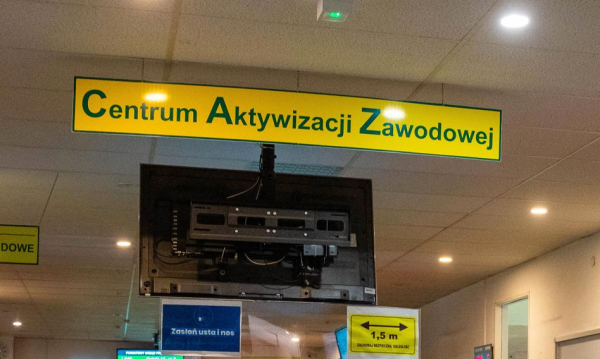Although unemployment in Poland is among the lowest in the European Union, it turns out that finding a job is becoming increasingly difficult. Over the past year, the number of new offers has fallen by almost 13 percent, and people looking for employment have an increasingly difficult path to overcome – according to the latest report of the Polish Agency for Enterprise Development “Labor market, education, competences. Current trends and research results (April 2025)”. We asked labor market experts what changes they think are taking place here and who will be affected the most.

Although data from the Central Statistical Office and the Polish Agency for Enterprise Development indicate that the Polish labor market can still boast one of the lowest unemployment rates in the European Union (in March it was 5.3 percent) , it turns out that in practice finding employment is becoming increasingly difficult. The number of new offers has fallen by 12.9 percent, and companies are becoming more cautious in hiring. This means that people looking for employment are increasingly feeling the effects of a limited number of offers.
– Just four years ago, when I was looking for a job as a project manager, I could choose from a variety of offers. Now it turns out that not only are there significantly fewer offers, but also finding your dream job requires much more time – Andrzej Wróblewski from Wrocław tells Bankier.pl.
Young and old have it the hardest
According to the report of the Polish Agency for Enterprise Development “Labor market, education, competences. Current trends and research results (April 2025)” , the most difficult situation on the labor market is currently faced by young people entering the labor market and people over 55 years of age . According to Eurostat data, the registered unemployment rate among people under 25 is as high as 10.9%, which is more than twice the national average. In turn, as many as 63% of unemployed people over 50 years of age indicate that the main obstacle to finding employment is their age.
Recruitment is getting longer
The PARP report also shows that candidates wait the longest for a new job in industrial production , where the recruitment process has increased from 5.6 weeks to 6.3 weeks over the past three years. The situation is similar in the FMCG industry, where this period has increased from 5.6 weeks to 6.1 weeks, as well as in retail, where candidates must expect to wait up to 6 weeks, while in 2022 it was 4.6 weeks.
It turns out that the extension of recruitment processes is the result not only of greater caution on the part of companies, but also of the increasingly frequent use of modern selection tools, such as online tests or remote job interviews.
The number of offers for doctors increased by 40 percent.
Meanwhile, Adrian Szymański, Senior Executive Manager at HR consulting company HRK SA, believes that since the beginning of 2025 there has been a visible revival in recruitment activity.
– According to the report “Job Offers in Poland – February 2025” prepared by Grant Thornton, 255.7 thousand new job offers were published in February, which is 9 percent more year-on-year – Adrian Szymański tells Bankier.pl. – This is the third month in a row with positive dynamics, and the average annual dynamics over the last three months has reached a record level of 11 percent. The largest increases can be seen in the demand for manual workers (+11 percent) and in the health service, where the number of offers for doctors increased by as much as 40 percent, and for nurses by 11 percent. At the same time, data from the Central Statistical Office show that average employment in the enterprise sector in April this year was 0.8 percent lower than a year ago. This may indicate that despite the large number of advertisements, recruitment processes are extended, and employment is carried out with a delay or in more flexible forms of cooperation.
The HRK SA expert also confirms that recruitment for specialist and managerial positions is slower than it was a few years ago.
– Employers are making decisions more cautiously, often waiting for budget approval or quarterly results. On the other hand, candidates are more cautious about changing jobs – they are more likely to ask about stability, the direction of the company's development and real opportunities for promotion – adds Adrian Szymański.
The required positions are tailored to your needs
According to Magdalena Okulowska, president of the Wrocław Agglomeration Development Agency,
Although the unemployment rate is not fluctuating too much today, it is a fact that it is increasingly difficult to find a job, and employers complain that it is difficult for them to find suitable candidates.
– The job market is changing. We need tailor-made positions – explains Magdalena Okulowska to Bankier.pl. – There is talk of a crisis in the IT industry. In the past, anyone who had even a basic programming course could find a job, because there was a boom in this. Today, companies are only looking for specialists and juniors have little chance of doing so. I think that the number of jobs is sufficient to meet the demand. Only matching these jobs to competences is becoming increasingly difficult and this is something that needs to be worked on. It is not without reason that people talk about upskilling and reskilling, long-life learning and reaching for unused potential, such as mature people or women in the engineering and technical environment.
Increasingly older workers, increasingly higher labor costs
According to Agnieszka Kolanowska, Strategic Partnership Manager at Smart Solutions HR, the Polish labor market is currently in a phase of deep transformation.
– Shrinking labour resources resulting from negative population growth and an ageing society, with simultaneous increase in labour costs, mean that employers increasingly have to reach for non-standard solutions – Agnieszka Kolanowska tells Bankier.pl. – On the one hand, we observe the dynamic development of automation and investments in professions of the future, on the other – a growing openness to employing foreigners. This forces employees to develop competences of the future and retrain. Digital, analytical skills and the ability to cooperate with technology are becoming increasingly important. As a result , the structure of professions is also changing. In addition to hard skills, the importance of so-called soft skills is growing: flexibility, adaptability, communication skills. They determine how effectively we will function in the changing work environment. The emphasis will be placed primarily on education in the professions of tomorrow – related to AI, but also to the energy transformation and ESG – adds the expert.
Are the employer and employee markets intersecting?
According to the representative of Smart Solutions HR, it is difficult to answer unequivocally whether we are currently experiencing an employee's or employer's market.
– Much depends on the industry and the moment in the economic cycle. In the first half of the year, we observed a clear slowdown and seasonal “freezing” of employment. However, we are currently seeing a revival. The employee market and the employer market are at an intersection – says Agnieszka Kolanowska. – Candidates apply for jobs that match their interests and competences, they want to develop in areas that interest them, which indicates the still strong position of employees in some industries and market segments. At the same time, employers are increasingly able to fill vacancies in full, we are seeing better matching of supply to demand. I predict that in the second half of the year, the biggest challenges for employers will be effective intercultural communication and adaptation to global trends such as AI, ESG or legislative changes related to the employment of foreigners.
Fewer traditional jobs?
Grażyna Pogan, Business Development Manager at Smart Solutions HR, also believes that
We are currently in a transition phase in which the labor market oscillates between employee dominance and employer advantage.
– In many key sectors, such as education, healthcare or crafts, there is still a deficit of qualified employees . At the same time, increasing automation and the development of new technologies allow companies to optimize processes and reduce costs, which may in the long run reduce the number of traditional jobs and strengthen the employer's position – says Grażyna Pogan to Bankier.pl.
The problems of employees and employers overlap
However, according to Agata Fiedurek, director of Deininger Consulting Sp. z o. o., the employee still has the upper hand on the labor market.
– Many companies still report the need to employ more people and the difficulty in finding specialists – Agata Fiedurek tells Bankier.pl – However, openness is needed from employees at an early stage of their career or those who already have their first experiences but do not yet have a specific career path. Young people have such expectations that employers do not have specific answers to. They, in turn, would like to employ, but specialists in certain areas are not available . I believe that new technologies that already support us will help us solve these problems in the future. That they will be efficient enough so that an employee who sends their application does not get lost in the crowd of others, and the systems will perfectly match the candidate to the position – adds the expert.






